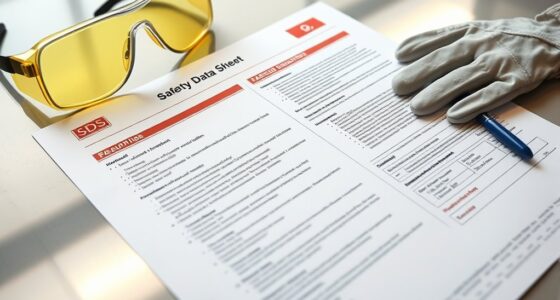In research, it’s essential for you to maintain data integrity by accurately collecting, analyzing, and honestly reporting findings, which builds trust and credibility. Fair authorship practices mean giving proper credit and avoiding ghost or honorary authorships. Protect participants’ privacy by following confidentiality policies, and disclose any conflicts of interest to stay transparent. Upholding these ethical standards ensures your work remains trustworthy and respected; learning more about these principles can help you navigate complex situations with confidence.
Key Takeaways
- Maintaining data integrity involves accurate collection, analysis, and reporting to ensure trustworthy research outcomes.
- Proper authorship ethics require fair attribution, avoiding ghost or honorary authorship, and clear communication of contributions.
- Transparency about conflicts of interest and potential biases helps uphold research credibility and objectivity.
- Protecting confidentiality preserves participant privacy and demonstrates respect for sensitive information.
- Upholding ethics fosters trust, integrity, and responsibility in scientific research and publication practices.

Ethics in research are fundamental to ensuring that scientific inquiry remains trustworthy and respectful of all individuals involved. As a researcher, you bear the responsibility of maintaining integrity in every aspect of your work. One critical element is safeguarding data integrity. This involves accurately collecting, analyzing, and reporting data without manipulation or fabrication. When you handle data properly, you uphold the scientific method and foster trust with your peers and the public. To support this, many institutions employ plagiarism detection tools to ensure originality and prevent misconduct. These tools help you verify that your work is free from uncredited sources, reinforcing ethical standards and protecting your reputation. Equally important are confidentiality policies, which guide how you handle sensitive information. Whether you’re working with personal data, proprietary information, or confidential participant details, strict adherence to confidentiality policies demonstrates your commitment to respecting individuals’ privacy and rights. You should always be transparent about how data is stored, who has access, and how it’s used, especially when sharing findings or publishing results. Violating confidentiality can harm participants and damage your credibility, so understanding and following these policies is essential. When it comes to authorship, ethics demand fairness and honesty. You must give proper credit to those who contributed significantly to the research, avoiding both ghost authorship and honorary authorship. Clear communication with your team about authorship roles from the outset can prevent disputes and ensure everyone’s contributions are recognized appropriately. Proper authorship not only reflects genuine involvement but also aligns with ethical standards set by professional organizations. Additionally, you should be transparent about any conflicts of interest that could influence your work, disclosing financial ties or personal relationships that might bias your findings. This openness helps preserve the objectivity and credibility of your research. Ultimately, ethical practices in research involve more than just following rules—they require a conscious effort to uphold honesty, respect, and responsibility at every stage. Whether you’re using plagiarism detection tools, protecting confidentiality, or assigning authorship correctly, your actions influence the integrity of the entire scientific community. By prioritizing these principles, you contribute to a research environment built on trust and accountability, ensuring that your work advances knowledge without compromising ethical standards. Moreover, understanding the importance of data integrity can help prevent unintentional errors that might compromise your results. Remember, maintaining high ethical standards isn’t just about avoiding misconduct; it’s about actively fostering a culture of integrity that benefits everyone involved in the pursuit of scientific discovery.
Frequently Asked Questions
How Can Researchers Ensure Data Security and Confidentiality?
To guarantee data security and confidentiality, you should use data encryption to protect sensitive information from unauthorized access. Additionally, you must have confidentiality agreements in place with all team members and collaborators, clearly outlining data handling protocols. Regularly update security measures, restrict data access to essential personnel, and monitor data storage systems to prevent breaches, ensuring your research maintains integrity and confidentiality throughout the process.
What Are the Consequences of Authorship Disputes?
Authorship conflicts can lead to damaged professional relationships, reputational harm, and even retractions of published work. When disputes arise, you need effective dispute resolution methods to address disagreements fairly and promptly. If unresolved, conflicts may result in loss of trust, academic penalties, or career setbacks. To prevent these consequences, establish clear authorship criteria early and communicate openly, ensuring everyone understands their roles and contributions from the outset.
How to Handle Accidental Data Fabrication or Falsification?
Addressing accidental data fabrication or falsification starts with acknowledging the mistake and prioritizing transparency. You should promptly perform data verification to assess the extent of the issue and consult your institution’s ethical training resources. It’s vital to report the error honestly, correct the data, and cooperate with any investigations. This approach helps maintain your integrity and upholds the research’s credibility, demonstrating your commitment to ethical standards.
What Role Do Peer Reviewers Play in Maintaining Research Integrity?
During the peer review process, you play a vital role in maintaining research integrity by critically evaluating the manuscript’s ethical standards and data validity. You examine whether authors have conducted ethical evaluations, guaranteed data accuracy, and properly attributed authorship. Your feedback helps identify potential issues like data fabrication or falsification, promoting transparency and trust in research. By upholding these standards, you contribute to the integrity and credibility of scientific knowledge.
How Is Misconduct Investigated in Academic Institutions?
Imagine a detective unraveling a tangled web—you investigate misconduct by initiating an institutional review, gathering evidence, and interviewing involved parties. You guarantee whistleblower protection so voices are heard without fear. Your institution follows strict protocols, examining data integrity and authorship issues thoroughly. If misconduct is confirmed, you take appropriate actions, maintaining research integrity like a lighthouse guiding ships safely through stormy waters.
Conclusion
As you uphold data integrity and rightful authorship, you build trust and credibility. Yet, neglecting ethics can tarnish your reputation and undermine your work’s value. It’s like planting a beautiful garden only to watch it wither without care. By choosing honesty over shortcuts, you create a legacy of respect and excellence. Remember, in research, integrity isn’t just a rule—it’s the foundation that makes your discoveries truly meaningful and lasting.









